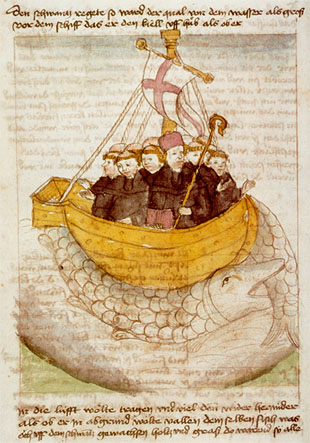
St Brendan -- German manuscript
1 I feel the winds of God today;
today my sail I lift,
though heavy oft with drenching spray
and torn with many a rift;
if hope but light the water's crest,
and Christ my bark will use,
I'll seek the seas at his behest,
and brave another cruise.
2 It is the wind of God that dries
my vain regretful tears,
until with braver thoughts shall rise
the purer, brighter years;
if cast on shores of selfish ease
or pleasure I should be,
O let me feel your freshening breeze,
and I'll put back to sea.
I have been reading a book by Monica Weis called Thomas Merton and the Celts which is about the most famous monk of the 21st century's reconnection with his Welsh roots in the final years of his life. Merton was fascinated with the concept of pilgrimage and Weis makes reference to Saint Brendan whose sea voyages were legendary. He may well have sailed to North America centuries before the Vikings. In doing so Weis mentions the book The Brendan Voyage by Tim Severin. I vaguely recollected that in the 1970's Severin and a small crew set sail from Ireland to cross the Atlantic in a coracle, an 11-metre boat made of oxhide and timber, lashed together with linen thread and leather thongs. While this was a re-creation of the sort of Medieval craft Irish monks might have sailed in, it sounded like a recipe for burial at sea.
If the ancient volume Navigatio, attributed to Brendan, was something of a factual account rather than just an entertaining legend, these sea-faring monks would have taken the "stepping stone" route to North America from Ireland to the Faroe Island, to Iceland and eventually to Newfoundland. I was curious enough to find the Severin book at the library so I could read the introduction. I found it so intriguing that I devoured the entire thing, absolutely gob-smacked by the courage these modern day explorers demonstrated in a journey fraught with both danger and wonder -- as with any good pilgrimage.
In the Navigatio Brendan and his monks saw fantastic things including great sea beasts, and flaming rock throwing giants, and towers of crystal through which they could pass. On Severin's voyage their small craft was regularly escorted by pods of dolphins and whales, and eventually they sailed past icebergs pierced by holes. They also stopped in Iceland, which has a number of volcanoes. Hmm.
St. Olaf Church Altarpiece, Faroe Islands --
Trondur Patursson (Brendan Voyage crew member)
I actually had goose-bumps when I came to the end and discovered that after 7,700 kilometres of sailing and rowing Severin and crew landed at Musgrave Harbour, Newfoundland, which is only a few kilometres from the pastoral charge I served at the beginning of my ministry. They made landfall almost exactly three years before we arrived in 1980.
I snooped around in the Navigatio and discovered that Brendan and company measured their progress and landfalls by the church year, including Lent (the season we're in now) and Easter. Even though they didn't know what perils faced them, or whether they would sail off the edge of the world, they were convinced Christ was their companion. Some think that the great hymn of the church, I Feel the Winds of God Today was inspired by Brendan and the Celtic monks who went out to sea. Powerful.
Comments?
3 If ever I forget your love
and how that love was shown,
lift high the blood-red flag above;
it bears your name alone.
Great pilot of my onward way,
you will not let me drift.
I feel the winds of God today;
today my sail I lift.
https://groundlingearthyheavenly.blogspot.com/2019/03/wild-lent-and-canadian-winters.html
Some Groundling blog thoughts on Wild Lent and Canadian Winters

No comments:
Post a Comment